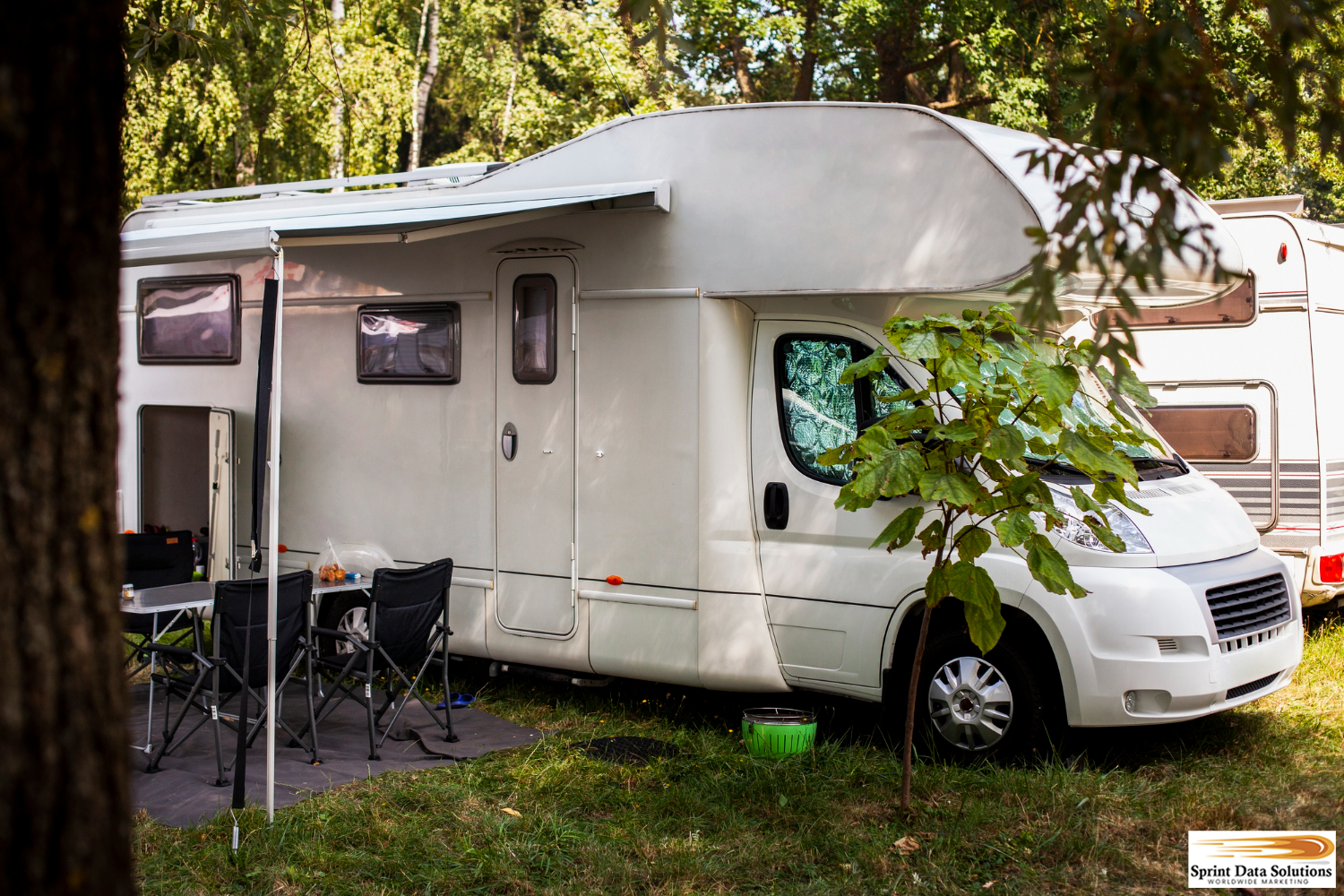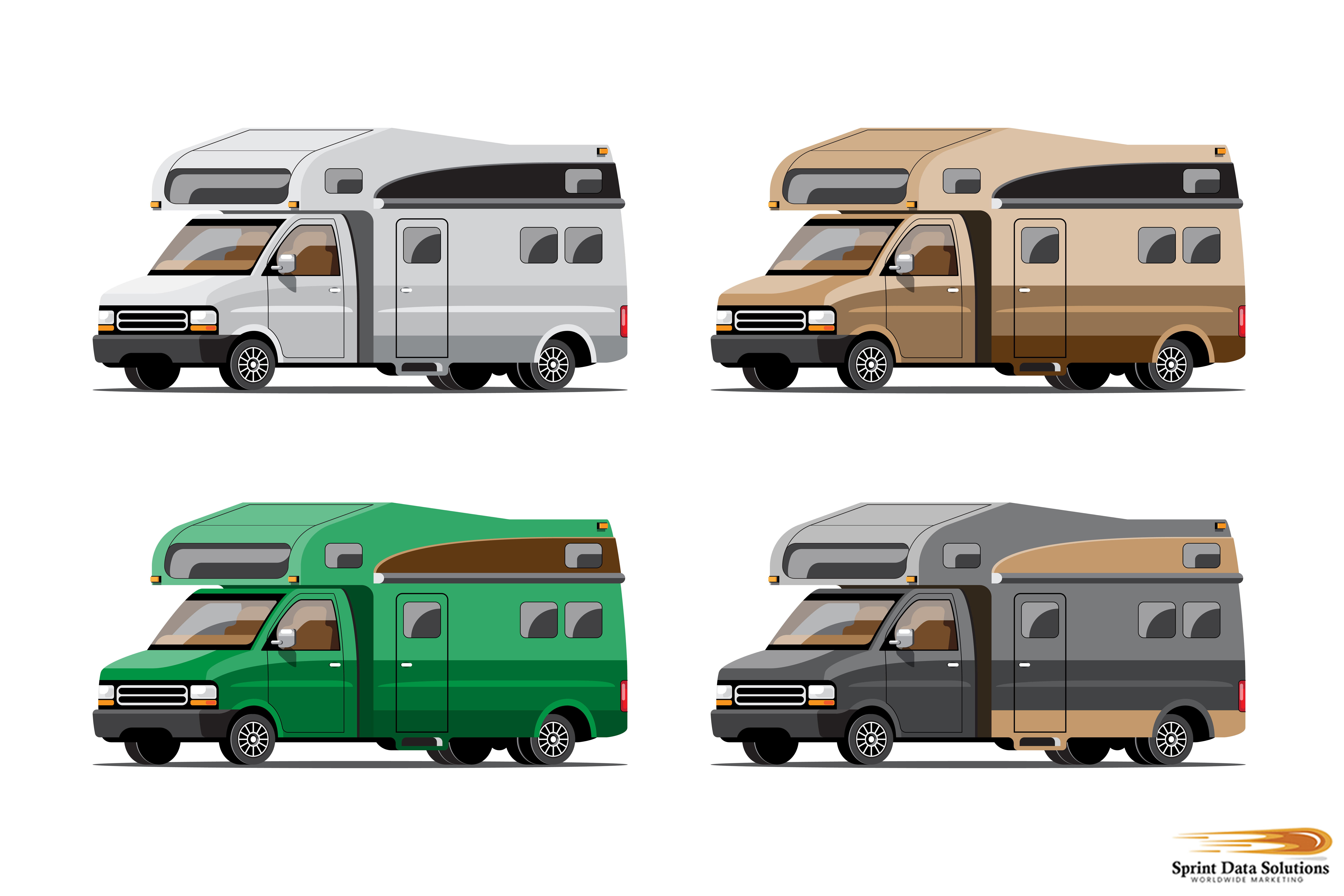RV Owners Are A Perfect Market For Your Business
There are generally two distinct types of RV (Recreational Vehicle) owners, each offering unique marketing opportunities. The first group includes those who use RVs for travel and exploration. These owners enjoy the freedom of the open road, creating their own itineraries, avoiding the hassle of hotel bookings, and traveling with everything they need—from home-cooked meals to their beloved pets. They often seek out scenic routes, state and national parks, and hidden gems across the country, embracing the adventure lifestyle with a passion for nature, flexibility, and discovery.
The second group consists of full-time RV dwellers. For some, RV living offers an affordable alternative to traditional housing, especially in high-cost areas or during retirement. Others are drawn to the nomadic lifestyle, moving with the seasons, chasing ideal weather, or simply enjoying new scenery every few months. Many of these RVers are minimalists who prefer a simplified life free from the clutter and costs of permanent residences. Some are remote workers who use mobile internet and smart tech to work from anywhere, while others are retirees looking to make the most of their golden years in comfort and mobility.
No matter which category they fall into, RV owners are an ideal audience for businesses that can support their unique needs. From camping gear, travel accessories, and solar-powered tech to pet supplies, internet solutions, vehicle maintenance, and roadside assistance—these consumers actively seek products and services that align with their mobile lifestyles. Reaching them directly is key, and that’s where our comprehensive RV Owners List comes in. It’s packed with up-to-date, accurate contact data to help your business connect with verified RV owners—whether they’re weekend explorers or full-time road warriors—so you can deliver the right message to the right people at the right time.

More People Are Buying RVs Every Year
Recreational vehicles (RVs) are experiencing a surge in popularity across the United States, with 11.2 million households currently owning an RV and an additional 9.6 million expressing plans to purchase one within the next five years. Between 2001 and 2021, RV ownership increased by more than 62%, reflecting a significant shift in American travel and lifestyle preferences. As of 2021, the RV market was valued at $33.95 billion and is projected to reach $59.16 billion by 2027, growing at a compound annual growth rate (CAGR) of 9.7%. This expansion is largely fueled by a cultural renaissance in outdoor recreation, with camping, road-tripping, and nature-based travel gaining widespread appeal. Millennials, in particular, have embraced RVs as part of the “van life” movement, prioritizing mobility, minimalism, and off-grid living. The rise of remote work has also made it easier for people to live and work from the road. Furthermore, RVs are increasingly viewed as a viable and more affordable housing alternative, particularly in the face of rising urban housing costs. The integration of advanced technologies—such as solar energy systems, lithium battery upgrades, Starlink satellite internet, mobile signal boosters, and smart home features—has transformed modern RVs into self-contained, tech-savvy living spaces, further boosting demand and expanding their appeal to younger and tech-driven consumers.
Valuable Demographics Of RV Owners
The RV ownership landscape in the United States reflects both traditional and evolving trends, with a notable shift toward younger demographics. While the majority of RV owners are still over the age of 55, a growing 34% are now between 18 and 54 years old, indicating increased adoption by younger adults. Millennials and Gen Z represent the fastest-growing segment of new RV owners, with 22% of all RVs now owned by adults aged 18 to 34. Though many RV owners are retired, approximately 30% still maintain full-time employment, often using their RVs for weekend getaways, remote work opportunities, or flexible travel lifestyles.
Family composition among RV owners shows a distinct pattern—77% do not have children living at home, suggesting that many are empty nesters, solo travelers, or couples without dependents. Interestingly, 59% of RV owners are women, surpassing the 40% male ownership, reflecting a growing trend of female-led RV travel, particularly among solo female travelers and women embracing van life. Financially, RV ownership leans toward middle to upper-income brackets, with 54% of owners reporting household incomes exceeding $65,000 annually.
Geographically, the states with the highest number of RV owners include Indiana—also home to many RV manufacturers—California, and Texas. However, RVs are often registered in states like Alaska, Montana, Delaware, New Hampshire, and Oregon due to their favorable tax environments, such as the absence of sales tax or lower registration fees, making them attractive for out-of-state buyers.
Usage trends reveal that most RV owners take their vehicles on the road for an average of 20 days per year, primarily for leisure rather than full-time living. Among them, 39% are classified as casual campers who take short, occasional trips, while 33% are family campers traveling with relatives. A smaller segment—approximately 1.5%—lives in their RVs year-round, and among this group, about 70% are women, often seeking freedom, minimalism, or nomadic lifestyles. This growing interest in full-time RV living, especially among women, highlights shifting priorities toward flexibility, adventure, and alternative housing solutions.
RV Owners Are An Ideal Target For Many Industries
Beyond RVs themselves, RV owners require a wide range of goods, products, and services that span numerous industries to support their unique lifestyle. From automotive and mechanical needs like tow-capable vehicles, tire maintenance, and generator servicing, to home-style comforts such as compact furniture, modular storage solutions, and energy-efficient appliances, their purchasing habits extend well beyond recreational vehicles. Many also invest in advanced technology, including solar power systems, satellite internet, GPS navigation, and signal boosters to stay connected while traveling.
Here are just some of the industries that will benefit from our RV owners list.
Insurance
All U.S. states mandate a minimum amount of liability insurance for vehicle owners, including those with recreational vehicles (RVs). This liability insurance typically includes property damage (PD) and bodily injury (BI) coverage, which help pay for damages or injuries the RV owner may cause to others in an accident. However, most RV owners—especially those who invest significant time or money in their vehicles—choose policies that go beyond the minimum. Many opt for comprehensive (comp) and collision (coll) coverage, which together are commonly referred to as “full coverage insurance.” These protections cover a wide range of risks, including damage from accidents, theft, fire, weather events, and vandalism, providing peace of mind for both part-time users and those who live in their RVs year-round.
For full-timers in particular, RV insurance needs often mirror those of homeowners, prompting them to add specialized endorsements. Popular insurance add-ons include uninsured motorist and underinsured motorist (UM/UIM) coverage, which provide protection if they are hit by a driver with insufficient or no insurance. Medical payments (med pay) coverage helps cover immediate medical expenses regardless of fault, while roadside assistance ensures help is available in the event of a breakdown. Many RV owners also choose vacation liability insurance, which extends liability coverage when the RV is parked and used as a temporary residence. Personal effects replacement coverage protects valuable belongings kept inside the RV, such as electronics, clothing, and kitchen appliances. Additionally, towing and labor coverage can be a financial lifesaver for larger RVs that require specialized towing equipment and services. All these options combine to create a customizable and protective insurance package tailored to the unique lifestyle of RV travel and living.
Travel And Tourism
RV owners are passionate travelers, often drawn to the freedom of the open road and the beauty of the natural world. They frequently explore iconic national parks, scenic state parks, and remote national forests, seeking out breathtaking landscapes and outdoor activities like hiking, birdwatching, fishing, or photography. Their self-contained accommodations allow them to stay in a wide range of locations, from well-equipped public RV campgrounds to privately owned RV resorts with added amenities such as Wi-Fi, laundry facilities, and recreational areas. In addition to nature-based destinations, RV owners enjoy discovering small towns, historic landmarks, and quirky roadside attractions that offer unique, offbeat experiences. For tourism companies, RV travelers represent an ideal customer segment—they already have their transportation and lodging sorted, making them more inclined to spend on local tours, attractions, dining, and experiences. Adventure tour operators, in particular, can benefit from marketing to RV owners, especially those with toy haulers, who often bring along motorcycles, ATVs, dirt bikes, or watercraft for added outdoor exploration. These owners are highly active, interested in gear and guided excursions, and willing to invest in memorable, high-adrenaline adventures.
Trucks And Other Towing Vehicles
RV trailer owners require vehicles that are specifically equipped to handle the weight and demands of towing, making towing capacity a critical factor in their purchasing decisions. Full-size pickup trucks, such as the Ford F-250, Ram 2500, and Chevrolet Silverado HD, are among the most popular choices due to their powerful engines, reinforced suspension systems, and high gross vehicle weight ratings (GVWR). However, midsize pickups and certain SUVs, including models like the Toyota 4Runner, Chevrolet Tahoe, and Jeep Grand Cherokee, are also widely used—especially when owners prioritize off-road capability and maneuverability in rugged environments. In addition to raw towing power, vehicles must be fitted with proper towing packages, which typically include factory-installed hitches, integrated trailer brake controllers, transmission coolers, and reinforced frames. Auto dealerships that offer tow-ready inventory—especially those that emphasize performance features, off-road capabilities, and aftermarket towing accessories—can significantly benefit from access to RV trailer owner lists. These buyers are often seeking specific vehicle upgrades and are more likely to engage with dealerships that understand their unique towing and lifestyle needs.
Navigation Devices
While traveling, RV owners rely heavily on navigation tools to plan routes, avoid road restrictions, and locate amenities tailored to their vehicle size. The most commonly used tools include in-dash navigation systems built specifically for RVs and smartphones with apps like RV LIFE or CoPilot GPS, which offer height, weight, and propane-restriction-aware routing. However, for those who prefer boondocking or venturing far off the beaten path, satellite-based navigation devices such as Garmin Overlander or GPS units with topographic mapping become essential. These tools provide reliable coverage in remote regions where traditional cellular signals drop off, ensuring RV travelers can confidently navigate forest service roads, desert trails, and other uncharted terrain. Many also pair these devices with offline maps and paper atlases as backup, especially when exploring national parks, wilderness areas, or backcountry routes.
Off-Grid Technology
Off-grid technology has become an essential and highly desirable feature among RV owners who seek independence and sustainability during their travels. Products such as high-efficiency water filtration systems, rooftop solar panels, and long-range signal-boosting antennas are especially popular among younger RV enthusiasts, particularly Millennials and Gen Z, who often prioritize eco-conscious living and remote work capabilities. This trend is especially strong among owners of Class B campervans, who value compact, multi-functional systems that maximize efficiency in limited space. Drivers of toy haulers also invest heavily in off-grid tech to support their active lifestyles, enabling them to power tools, charge devices, and maintain core amenities while stationed at remote base camps for outdoor adventures like biking or dirt biking. In addition to energy and communication tools, many RV owners are embracing environmentally friendly solutions such as composting toilets, gray water recycling systems, and solar-heated showers, which reduce dependence on campground hookups and minimize their environmental footprint. These green alternatives offer long-term cost savings and help travelers stay self-sufficient for extended periods off the grid.
Internet Accessibility Technology
Full-time RV owners, particularly the rising number of digital nomads and remote workers living in campervans, have a critical need for reliable internet access. For this demographic, staying connected isn’t just about entertainment—it’s essential for work, communication, navigation, and even managing finances or healthcare. Satellite internet and satellite television remain popular for their broad geographic reach, especially in rural or off-grid areas where traditional coverage is sparse. However, satellite solutions are often paired with other tools like cellular routers, mobile hotspots, and signal-boosting antennas that amplify weak LTE or 5G signals in remote regions. Many RVers employ a hybrid connectivity strategy, using multiple data plans or providers to maximize coverage and minimize downtime. Equipment such as rooftop-mounted antennas, directional boosters, and multi-SIM routers are common among serious travelers. This growing tech-dependent lifestyle offers a unique opportunity for internet providers to offer RV-specific packages or rugged equipment bundles. Targeted marketing to this niche can be highly effective, especially if it emphasizes nationwide reach, flexible data plans, or specialized customer support for mobile living.
Outdoor Outfitters
RV owners are deeply passionate about the outdoors and often build their lifestyles around adventure, exploration, and self-sufficiency. Many invest in outdoor recreational vehicles to complement their travels, including mountain bikes for trail riding, dirt bikes and enduro motorcycles for rugged terrain, and quads (ATVs) for all-purpose off-road use. Their enthusiasm for water-based activities also leads them to purchase personal watercraft like kayaks for river expeditions, canoes for lake exploration, and jet skis for high-speed fun on open water. To support extended stays in remote locations, RV owners rely heavily on versatile and durable camping equipment—this includes compact cookware suited for open flames or portable stoves, LED lighting systems that conserve power, and multi-use camp tools like hatchets, folding shovels, and fire starters.
For maximizing outdoor living comfort, they also invest in gear like all-weather tents for guests or solo excursions, retractable awnings that provide essential shade and rain protection, and rugged camping furniture such as collapsible chairs, portable picnic tables, and hammocks. Their apparel choices reflect both function and rugged style, with hiking boots designed for long treks, base layers for thermal regulation, moisture-wicking shirts, and cargo pants with multiple pockets for tools and gear. Because many RV owners enjoy self-sustaining hobbies, they also tend to purchase a wide array of fishing and hunting equipment—from rods, tackle boxes, and bait to compound bows, game calls, and camouflage clothing—highlighting their deep connection to nature and the outdoors. This lifestyle fuels a strong and consistent demand for high-performance, reliable outdoor products.
Mechanical Tools
Both motorhome and trailer RV owners tend to be self-reliant and often come prepared to handle a range of mechanical or emergency situations on the road. Many take pride in performing their own routine maintenance and minor repairs, which makes a comprehensive tool selection essential. Most carry standard mechanical tools such as socket sets, combination wrenches, pliers, screwdrivers, and torque wrenches to address mechanical issues or make adjustments. In addition to basic tools, they frequently bring specialized RV tools like voltage meters for electrical troubleshooting, sealant guns for minor leaks, and water pressure regulators to protect plumbing systems. Emergency tool kits are also common and typically include portable air compressors or tire inflators, jumper cables or lithium-ion battery jump starters, digital tire pressure gauges, and tire repair kits. Many RVers also invest in advanced safety gear, such as wireless tire pressure monitoring systems (TPMS) and portable diagnostic scanners for vehicle health. For unexpected roadside issues, flare guns or LED emergency beacons, reflective warning triangles, fire extinguishers, and stocked first aid kits are standard. These kits are often supplemented with weather-specific gear like thermal blankets, rain ponchos, and multi-tools. Overall, the emphasis on preparedness is high among RV owners, with many tailoring their kits to the destinations they travel and the potential risks they may encounter.
Small Kitchen Appliances
RV owners, whether living full-time on the road or using their vehicles for weekend getaways, constantly seek space-saving solutions that enhance their comfort without sacrificing limited square footage. Full-time RV dwellers, in particular, prioritize multi-functional, compact kitchen appliances that can replace traditional home-sized options. Appliances like Instant Pots, which serve as pressure cookers, slow cookers, rice makers, and more, are highly valued for their versatility. Air fryers are another popular choice due to their compact size and ability to prepare crispy meals with little to no oil, while compact convection or microwave ovens are often used in place of bulky stoves or ovens. On the other hand, recreational RV users—those who travel seasonally or for leisure—often focus on enhancing their social and entertainment experiences. These owners frequently purchase portable ice makers for keeping drinks chilled, margarita machines for festive outdoor gatherings, and ice cream makers as a fun way to enjoy frozen treats with family or guests. In both lifestyles, the focus is on compact, efficient appliances that deliver maximum utility and enjoyment within the RV’s space constraints.
Specialty RV Accessories
RV owners frequently invest in a wide range of specialized accessories and upgrades designed to enhance both the safety and comfort of their mobile living spaces. Essential items such as surge protectors are commonly purchased to safeguard expensive electrical systems from unpredictable campground power fluctuations, while high-quality sewage hoses and connectors ensure sanitary and reliable waste disposal. Water pressure gauges are also standard additions, helping to regulate incoming water from various hookups and prevent plumbing damage. In terms of comfort and functionality, RV-specific furniture is a major area of investment—many owners opt for space-saving solutions like telescoping tables that fold or collapse when not in use, mounted gliders that provide the relaxing motion of a rocking chair without taking up floor space, and memory foam mattresses for better sleep during long travels.
Owners of Class B RVs, in particular, tend to be highly selective and innovative with their interior upgrades due to the limited space available in their campervans. These compact RVs often feature modular furniture that can serve multiple purposes, such as benches that convert into beds or workstations that fold into walls. Class B owners also prioritize compact appliances that offer full functionality without occupying much space—such as combination microwave-convection ovens, slim-profile refrigerators, and single-burner induction cooktops. To support off-grid travel or boondocking, they frequently invest in advanced electrical system components like pure sine wave inverters, solar charge controllers, lithium battery banks, and smart monitoring systems that track energy usage and optimize power distribution. Altogether, these purchases reflect a strong emphasis on functionality, comfort, and efficient space utilization, especially among RV enthusiasts who treat their vehicles as both a travel tool and a home on wheels.
Storage
RV owners who do not live in their vehicles full-time often face the challenge of finding secure, weather-protected places to store their RVs during the off-season or between trips. This creates a valuable opportunity for self-storage businesses, especially those that offer specialized indoor or outdoor RV storage options. Indoor storage provides shelter from harsh weather conditions, UV damage, and extreme temperatures, while outdoor storage is often more affordable and convenient, especially when paired with covered parking spaces. In both cases, RV owners prioritize safety and preservation, which drives demand for quality storage accessories like heavy-duty, breathable storage covers that prevent moisture buildup and mildew. Stabilizing jacks and wheel chocks are also essential to prevent movement and uneven weight distribution during long-term storage. Additionally, many owners invest in advanced RV-specific security systems—such as motion-activated cameras, GPS tracking devices, and door/window alarms—to protect their high-value assets while stored away from home. This combination of storage services and protective gear represents a thriving market for businesses targeting RV owners.
Towable And Drivable RVs
RVs fall into two main categories, each offering distinct advantages depending on the traveler’s lifestyle and needs. The first category is drivable RVs, commonly referred to as motorhomes. These are self-contained vehicles equipped with living quarters that can be driven directly from place to place without the need for an additional vehicle. Motorhomes are convenient for long-distance travel and provide a seamless travel experience, allowing passengers to access living spaces while on the move. The second category is towable RVs, which must be hitched to a separate vehicle for transportation. This category includes travel trailers, fifth-wheel trailers, and pop-up campers. Towable RVs tend to be more cost-effective both in terms of purchase price and maintenance, making them a popular choice for budget-conscious travelers or those who already own a suitable tow vehicle. While motorhomes offer integrated mobility and convenience, towables often provide greater flexibility in terms of campsite setup and the ability to explore local areas using the towing vehicle. Both types come in a wide range of models—from basic, no-frills units to high-end options with luxury features such as full kitchens, entertainment systems, and high-tech climate control. The price of an RV can vary significantly depending on the size, brand, and included amenities, making it possible for both casual campers and full-time travelers to find an option that fits their preferences and budget.

The Different Types Of RVs
Recreational vehicles (RVs) come in a wide variety of styles and configurations, generally divided into two main categories: motorized and towable. Each type offers its own set of features tailored to different travel preferences, lifestyles, and budgets. From compact campervans designed for solo travelers or couples to expansive fifth-wheel trailers and motorhomes built for full-time living, RVs are equipped with a diverse range of amenities such as kitchens, bathrooms, slide-out rooms, entertainment systems, and climate control. Some are designed for off-grid adventures with solar power and water filtration systems, while others prioritize luxury and spaciousness with high-end appliances and multi-room layouts. This diversity allows travelers to choose the right RV to match their specific needs—whether for weekend getaways, seasonal road trips, or year-round mobile living. Some are better for full-time living, while others are designed specifically for camping.
Class A
Class A RVs represent the largest and most luxurious category of recreational vehicles available on the market, often stretching up to 45 feet in length—comparable to a full-sized city transit bus. Built on heavy-duty bus or commercial truck chassis, they are designed to serve as a true home on wheels. There are two main types: gas-powered Class A RVs, which are typically more affordable up front and easier to maintain, and diesel-powered models, known as “diesel pushers,” which place the engine in the rear for a quieter ride and better weight distribution, offering superior torque and longevity for long-distance travel.
Inside, these motorhomes boast residential-style amenities that cater to full-time living, including full-sized kitchen appliances like refrigerators, stoves, ovens, and even dishwashers. Many come with washer and dryer units, king-sized beds, and master bathrooms featuring large showers or full bathtubs. Slide-out sections are common, expanding the living space significantly when parked—some units even have multiple slide-outs for added width and comfort. High-end finishes such as solid wood cabinetry, premium flooring, and theater seating enhance the luxury feel. Ample basement and interior storage compartments allow residents to bring along everything they need for extended travel or permanent living. While ideal for those seeking a mobile lifestyle without sacrificing space or convenience, Class A RVs are costly to operate, require significant fuel, and can be challenging to maneuver in tight spaces or urban environments.
Class B
Class B RVs, commonly known as camper vans, have surged in popularity, particularly among Millennials and Gen Z travelers who value mobility, versatility, and minimalist living. These compact motorhomes are typically built on a standard van or truck chassis—such as the Mercedes-Benz Sprinter, Ram ProMaster, or Ford Transit—and are available with either gasoline or diesel engines. Measuring approximately 18 to 25 feet in length, they strike a balance between comfort and maneuverability, making them especially well-suited for both city driving and navigating tight, off-the-grid paths. Their relatively compact size allows for lower fuel consumption compared to larger Class A or Class C models, which adds to their appeal for budget-conscious and eco-aware travelers.
Despite their smaller footprint, Class B RVs are masterfully engineered to maximize interior space. Many feature convertible sleeping arrangements, compact kitchens with sinks, stovetops, and mini-fridges, wet bath-style bathrooms with shower and toilet combos, and multi-use lounge areas. Their self-contained nature means they often come equipped with solar panels, freshwater and gray water tanks, and onboard generators or lithium batteries, allowing users to camp off-grid for extended periods. This makes them ideal for both stealth camping in urban environments—where their inconspicuous size helps them blend in—and for exploring remote natural settings with ease.
While many owners use camper vans for weekend getaways and outdoor adventures, a growing number of digital nomads and minimalist enthusiasts are choosing to live in them full-time. These full-time vanlifers often customize their vans further to include workspace solutions, upgraded insulation, enhanced Wi-Fi capabilities, and other features tailored to long-term travel and remote work. As housing costs rise and flexible work arrangements become more common, Class B RVs have emerged as a practical and appealing lifestyle option for a new generation seeking freedom and functionality on the road.
Class C
Class C motorhomes are a versatile and popular choice for RV enthusiasts who want many of the comforts of a Class A motorhome but in a more compact and manageable format. Built on a truck or van chassis, Class C RVs are instantly recognizable by their distinctive cabover section—an extended area over the driving cab that typically houses an extra bed or storage, making excellent use of vertical space. While they may be smaller in overall length compared to Class A models, Class C motorhomes still offer a full suite of residential-style amenities, including well-equipped kitchens, full bathrooms with showers, dinettes, lounges, and multiple sleeping areas. Many models come with slide-outs that expand living space when parked, while others maintain a fixed layout for simplicity and reliability.
Their smaller size also makes them more fuel-efficient and easier to maneuver than their larger Class A counterparts, allowing access to a wider range of campsites, including those with stricter length restrictions. This makes them especially attractive for national park visits and remote destinations. Class C motorhomes are often favored by families and small groups due to their ability to comfortably sleep five to eight people, depending on the configuration. They also appeal to full-time RVers who want a balance of spaciousness, drivability, and affordability. Additionally, newer models often include advanced driving aids, solar power options, and modern entertainment systems, enhancing both convenience and livability on the road.
Pop-Up Trailers
Pop-up trailers, also known as folding campers or tent trailers, are a lightweight and compact form of recreational vehicle specifically designed for camping enthusiasts. Their primary appeal lies in their ability to collapse into a small, towable unit that can be easily hauled by most vehicles, including SUVs and even some sedans. Once set up at the campsite, the trailer unfolds or “pops up” to reveal canvas walls with screened windows and expanded sleeping areas that often extend outward from both ends. This unique structure offers the fresh-air feeling of tent camping while keeping users elevated off the ground and protected from the elements. Many models include additional amenities such as small kitchens, dining areas, and storage compartments, providing more comfort than traditional tents. Pop-up campers are a favorite among families, couples, and solo adventurers alike due to their low cost, minimal storage requirements, and ease of use. As one of the most budget-friendly RV categories available, they are an ideal entry point for those new to RV camping or for experienced campers seeking a simpler, more nature-immersed experience.
Teardrop Trailers
Teardrop trailers are compact, lightweight campers that are highly favored by minimalist adventurers and weekend travelers who want convenience without sacrificing comfort. Named for their distinctive teardrop shape—rounded in front and tapering in the rear—these trailers are designed for aerodynamic towing and easy maneuverability. While they share the portability and convenience of pop-up trailers, teardrop trailers offer a hard-sided, enclosed structure that eliminates the setup time required with tents or collapsible campers. Despite their small size, many teardrop campers make efficient use of space, often including a rear galley kitchen accessible from outside, interior sleeping quarters for two or more people, built-in cabinetry, and in some upgraded models, small bathrooms or portable toilet storage. Their lightweight frames allow them to be towed by most vehicles, including sedans, small SUVs, and electric cars, making them an accessible choice for a wide range of outdoor enthusiasts. Their simplicity, ease of storage, and low maintenance requirements continue to make teardrop trailers a popular option for casual campers and road trippers alike.
Travel Trailers
Travel trailers are the most popular and versatile type of towable RV, appealing to a broad range of travelers, from weekend campers to full-time RV dwellers. They attach to a standard rear hitch on a tow-capable vehicle, making them relatively easy to transport and set up at campgrounds, RV parks, or even on private land. Available in a wide variety of lengths, floorplans, and amenities, travel trailers can comfortably accommodate singles, couples, and larger families alike. Many are equipped with full kitchens, spacious bathrooms, slide-outs for extra living space, and residential-style features such as entertainment centers, heating and cooling systems, and ample storage. Their affordability compared to other RV types makes them especially attractive to budget-conscious buyers, yet they still provide the essential comforts of home. However, due to their size and weight, travel trailers typically require a full-size SUV or pickup truck with sufficient towing capacity to ensure safe travel.
Toy Haulers
Toy haulers are purpose-built RVs for adventure seekers who bring their gear along for the ride. These versatile units feature a built-in garage space at the rear, designed to transport and store “toys” like dirt bikes, ATVs, snowmobiles, jet skis, and even small boats or side-by-sides. Available in both travel trailer and fifth-wheel configurations—and occasionally as Class A or C motorhomes with toy-hauling capability—these rigs are built to handle rugged excursions. Beyond the garage, toy haulers offer full living accommodations, including kitchens, bathrooms, entertainment areas, and sleeping quarters for families or groups. Many modern models come equipped with fold-down patios or rear decks, creating an outdoor lounge space that’s perfect for watching sunsets, cooking out, or unwinding after a day of off-road fun. With heavy-duty frames, upgraded suspension, and high towing capacities, they are ideal base camps for off-road riders, hunters, motorsports enthusiasts, and anyone who prefers remote, outdoor living without sacrificing comfort or amenities.
Fifth-Wheel Trailers
Fifth-wheel trailers are the largest and most luxurious category of towable RVs, engineered specifically to be hauled by heavy-duty pickup trucks equipped with a special hitch mounted in the truck bed. Their distinctive raised forward section, which typically houses the master bedroom or a multi-use loft, provides additional interior space and separation between living areas. These RVs are especially popular among full-time RVers and long-term travelers due to their residential feel and spacious layouts. Many fifth-wheel trailers feature multiple slide-outs that significantly expand the living, dining, and sleeping areas, allowing for more comfortable daily use. High-end models often come equipped with full-sized kitchens, washer and dryer hookups, home entertainment systems, and climate control technologies. Additionally, many include off-grid capabilities such as solar panels, large freshwater tanks, and advanced battery systems, making them ideal for boondocking or extended stays in remote locations. Their combination of size, comfort, and mobility makes them a top choice for those seeking a home-away-from-home experience without sacrificing modern conveniences.
Truck Campers
Truck campers are a unique and highly versatile type of RV designed to slide directly into the bed of a pickup truck, transforming the vehicle into a compact and mobile living space. This setup allows travelers to enjoy the maneuverability and drivability of a standard truck while gaining many of the conveniences found in larger RVs. Truck campers are especially popular among outdoor enthusiasts, including hunters, anglers, and off-road adventurers, thanks to their ability to access rugged and remote locations that are often inaccessible to larger motorhomes or trailers. Though smaller in size, truck campers often come equipped with essential amenities such as a kitchenette, wet bath, dinette, and sleeping quarters. The sleeping area is typically located in the cabover section, extending over the truck’s roof—similar to the layout found in Class C motorhomes. Many modern truck campers feature slide-outs or pop-up roofs to maximize interior space, making them surprisingly comfortable for solo travelers or couples seeking a nimble and budget-friendly RV option. Additionally, truck campers can be detached at the campsite, allowing the truck to be used independently for local travel or errands.

We Can Help You Tap Into This Growing Market
Founded in Las Vegas by a Service-Disabled Veteran, Sprint Data Solutions Worldwide Marketing has grown into one of the nation’s most trusted providers of consumer and business marketing data. With a commitment to integrity, precision, and innovation, we’ve built one of the largest and most detailed consumer databases in the industry. Our expansive inventory includes highly segmented specialty lists—such as RV ownership, luxury travelers, senior consumers, new movers, and more—each carefully curated to help you connect with the audiences that matter most to your goals. Every list is enhanced with a combination of demographic, psychographic, and lifestyle data points, allowing you to craft personalized, data-driven marketing campaigns that resonate with your ideal customers on a deeper level.
What truly sets Sprint Data Solutions apart is our unwavering focus on data quality and compliance. Our contact information is collected through fully legal, ethically sound channels and regularly updated to ensure accuracy. We employ rigorous validation protocols using trusted systems such as the National Change of Address (NCOA) and the Certified Address Accuracy System (CAAS), supplemented by our own in-house verification processes. These multi-layered checks ensure that our clients receive data that is not only fresh and relevant but also highly responsive. Whether you’re launching a direct mail campaign, email outreach, or telemarketing initiative, our lists are designed to maximize ROI by helping you reach the right people at the right time with the right message. Let Sprint Data Solutions Worldwide Marketing help you unlock new opportunities with precision-targeted, high-performance data solutions.
Target The Right RV Owner For Your Campaign
With a premium-quality list from Sprint Data Solutions Worldwide Marketing, you gain more than just access to names and numbers—you gain a strategic advantage. Our robust, fully vetted databases are built to help you connect with the people who are most likely to respond to your message. Whether you’re launching an email campaign, planning a direct mail initiative, or organizing a multi-channel marketing strategy, our data empowers you to craft messaging that truly resonates. Each contact is selected based on demographic, geographic, and behavioral insights, allowing you to address specific customer needs, solve real problems, and drive conversions.
When you purchase a list from us, you won’t be left on your own. Our experienced team will personally guide you through the data, helping you understand its structure, refine your targeting, and implement smart strategies to maximize your return on investment. With decades of marketing experience behind us, we know how to turn data into results.
Contact us today to get started. The knowledgeable and friendly professionals at Sprint Data Solutions Worldwide Marketing are ready to answer your questions, provide a custom quote, and help you select the best list to meet your objectives.






